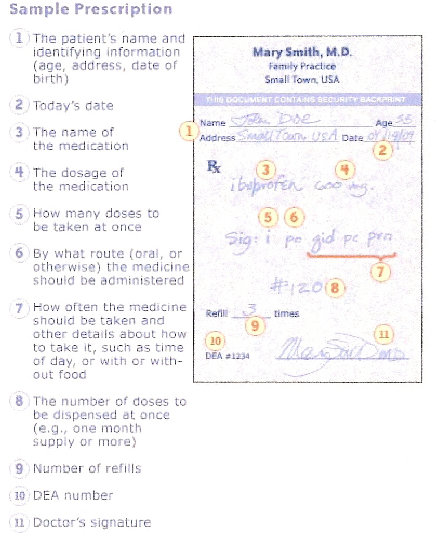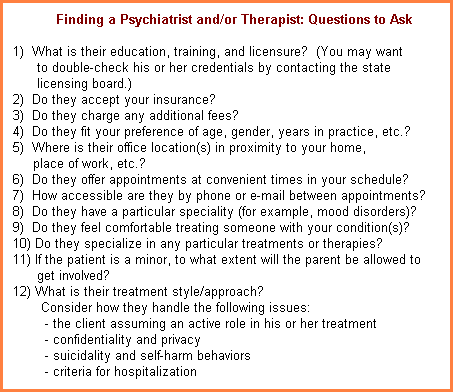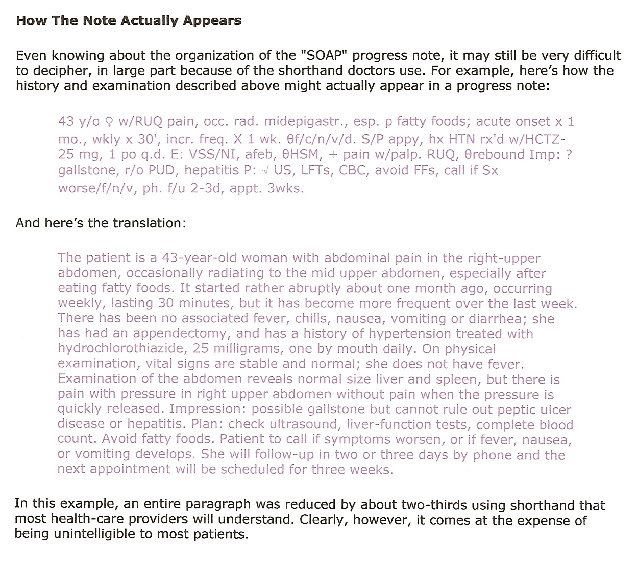Working With Professionals:
Things to Consider
Being
Your Own Patient Advocate: The Voice That Counts Most
Do your
homework. Find out which providers are covered by your insurance
plan. Get recommendations. Use any initial phone contacts
and/or the consultation to ascertain your comfort level with
the psychiatrist or therapist. Educate yourself about your illness
and treatments available.
Be prepared for appointments. Have the date and time recorded, particularly if your memory is less
than perfect. Go into the appointment with a set agenda.
Make a list of things you wish to bring up, which could include new
side effects you experienced, prescription refills you need, your
feelings about the medication(s), issues you'd like to explore, etc.
Take
steps to ensure you'll remember what was said in your appointment. Take written notes. Tape record your session. Bring in
a friend or family member (even if it's just for a re-cap at the end
of your appointment).
Keep a copy of your own records. Request copies of lab reports. Take photocopies of prescription
slips. Make duplicates of any tracking tools such as mood logs
and depression inventories. Remember that you have the
right to see your patient chart upon request.
Follow up on lab
results. Don't assume that, just because you haven't heard back
from them, the results were completely fine. There's always
the possibility that the labs got lost, the doctor thought he contacted
you when he really hadn't, etc.
Write down information about
prescriptions. Doctors are notorious for their atrocious handwriting.
To avoid getting the wrong medication at the pharmacy, be
sure to jot down info like the name of the drug and the dosage.
When picking up your prescription(s), check all labels and verify verbally
with the pharmacist that the drug you're taking home is, in fact,
the drug that should be going home with you. Be sure to
ask your psychiatrist and/or pharmacist any questions you may have
about a particular medication or drug regimen.
Attempt to fill
all prescriptions at the same pharmacy. They know you best and
have records of previous medications you've been prescribed, so they're
more likely to catch potentially dangerous drug interactions.
Speak
up. If there's something you don't quite comprehend or you
have additional questions, be sure to bring them up. The
only stupid question is the one that's never posed. You
never know when that question will bring up another pertinent
issue that could, potentially, alter the course of your treatment.
Cutting the Cost of Prescription Meds
Know
which drugs are covered by your insurance. Refer to this list,
in particular, when discussing new meds with your doctor.
The medication he or she may have considered prescribing
originally might not be listed, but a similar medication (or generic
version) might be on the list.
Go generic. Most generic
meds tend to be cheaper than their fancy, brand name counterparts.
Purchase
a pill cutter. For meds that can be split, buying a higher dose
version of the drug (then splitting it to your current dosage) can
save you some money. Caution: Especially if you are suicidal,
you should only have access to a minimum number of pills at any
given time to ensure your safety.
Discontinue unnecessary
meds. Talk to your doctor about medications that may not be
effective or may be doing the same job as another drug. Perhaps
it's one you can eliminate.
Call ahead to see if the prescription
is ready. There's no sense making the trip out to the pharmacy
if you're just going to have to return a few days later.
You may want to get an estimate at the time the prescription is called/brought
in for the amount of time it will take the pharmacist to fill
your prescription.
Take advantage of company programs. If
you meet the qualifications, why not seize the opportunity to cut
costs with the assistance of established programs through
drug companies?!
Click here for a list of company programs.
Getting to Know Your
Medication: Familiarize Yourself With These
1) Drug
class
2) Uses of the drug
3) How the drug works
4) How
to take the medication
5) Drug interactions
6) Storage
of the medication
Learning
Your ABCs: Common
Diagnostic Test Abbreviations
BMR
- basal metabolic rate
BUN - blood urea nitrogen
C&S - urine culture
and sensitivity
CBC - complete blood count
CK - creatine kinase
CPK -
creatine phosphokinase
CT scan, CAT scan - computed (axial)
tomography scan
Diff - differential count (white blood cells)
ECG/EKG
- electrocardiogram
ECHO - echocardiogram
EEG - electroencephalogram,
electroencephalograph
ESR - erythrocyte (red blood cell)
sedimentation rate
FBS - fasting blood sugar
FSH
- follicle-stimulating hormone
GTT - glucose tolerance test
HCT, Hct -
hematocrit
HDL - high density lipoprotein
HGB, Hgb, Hb - hemoglobin
K+
- potassium
LDL - low density lipoprotein
LH - luteinizing hormone
MRI
- magnetic resonance imaging
Na+ - sodium
PCV - packed cell volume
(hematocrit)
PET - positron emission tomography
SGOT, SGPT - liver function
enzyme tests
SR - sedimentation rate
T3 - triiodothyronine
T4
- thyroxine
TSH - thyroid stimulating hormone
UA - urine analysis
WBC
- white blood cell count
For additional information regarding
these tests, refer to the websites under
page of The Depression Guide.
References
"Choosing
a Psychiatrist"
American Psychiatric Association
www.psych.org
Medical Terminology: A Systems Approach, 4th Edition
Barbara A. Gylys and Mary Ellen Wedding
F.A. Davis
Company, Philadelphia. 1999
"Mental Health Providers: Making
the Right Choice"
www.mayoclinic.com
"Popular
Medicines and Drug Information You Should Know"
September 16, 2004
www.medicinenet.com
"Psychotherapy:
How it Works and How it Can Help"
www.dbsalliance.org
"Reading
Your Medical Record"
September 26, 2003
www.intelihealth.com
"Reclaiming Your Power During Medication
Appointments With Your Psychiatrist"
Patricia Deegan,
Ph.D.
www.power2u.org
"Understanding Your Prescription
Slip"
March 26, 2004
www.intelihealth.com

Common
Abbreviations
#5 Number of doses:
sig - "let it be labeled" ("signetur")
i, ii, iii, iv - 1, 2, 3, 4 (number to be
taken at one time)
#6 Mode of administration:
po - by mouth, orally ("per os")
pr - suppository
("per rectum)
sl - under the tongue ("sublingual")
IV
- intravenous
IM - intramuscular
SQ
- under the skin ("subcutaneous")
#7 Frequency of
administration:
qd - every day ("quaque die")
bid - twice a day ("bis in die")
tid
- three times daily ("ter in die")
qid - four
times daily ("quater in die")
Specifications of this category include:
pc
- after meals, not on an empty
stomach ("post cibum")
qhs - each night ("quaque
hora somni")
prn - as needed ("pro re nata")
#10 Drug
Enforcement Agency (DEA)
number:
Doctor's DEA number, necessary
for
controlled substances
Why Should I See a Psychiatrist?
Psychiatrists are physicians who specialize in the diagnosis
and treatment of mental illness.
A psychiatrist can help
you:
- diagnose your condition based on your history
and
current symptoms
- order diagnostic laboratory tests
- conduct
in depth psychological and
neurological exams
- examine your
family history
- rule out other potential causes of your illness
(differential
diagnosis)
- educate you about your illness(es)
- prescribe medications
-
monitor side effects
- recommend alternative treatments
- provide psychotherapy
Why Should I See a Therapist?
Therapists can come from a variety of training backgrounds (Ph.D.,
L.C.S.W., etc.) and specialize in psychotherapy techniques.
A
therapist can help you:
- better understand your illness
- develop effective
coping skills
- create a working crisis plan
- identify triggers in
your environment
- plan and stick with treatment
- overcome challenges
-
improve your relationships with other people,
as well as with
yourself
- eliminate maladaptive coping behaviors such
as drinking,
smoking, drugs, self-injury,
binge-eating, etc.
- build self-confidence
-
devise a plan for the future
Your
treatment team is an integral part of your recovery. Working
with professionals who are knowledgeable in the field and skillful
in their approach to treatment can expedite your recovery process.
There are many different types of professionals working within mental
health care; however, it appears to be common and beneficial to have
both a psychiatrist and therapist at the center of your treatment.
Just be sure to sign the necessary papers authorizing the exchange
of
information between the two professionals.
7) List of possible side effects
8) What
to do if you miss a dose
9) What to do in the event of an emergency
10)
If a medical alert bracelet is advised
11) Whether or not any laboratory
tests are necessary
12) When you might expect to see improvement
Interpretation
of a Prescription Slip
Decoding Your Medical Chart
If you opt to flip through
your medical chart, good luck! Aside from the chicken scratch
writing typically associated with physicians, efficiency in these
charts oftentimes calls for "medicalese"--a language most of us didn't
have the option of taking back in high school.
Nevertheless,
there is a time and a place to try your hand at medical chart interpretation.
The right to see your records can come in handy if, for example, you
believe your doctor is holding back information from you.
It's
probably best that you make your way through this maze while
in the presence of your physician so that they can point out important
details and answer any questions you may have. However,
if you don't have this luxury, here are some things to keep in mind.
Progress notes in medical charts typically take the form of
"SOAP":
Subjective - includes symptoms and chief complaints and
any factors that may be making them better or worse
Objective
- describes findings from laboratory reports as well as the physical
examination
Assessment - physician impressions or thoughts, perhaps
with other possible explanations for the symptoms
Plan - list
of things such as recommendations (tests, medications, etc.), referrals,
and contingency plans
The excerpt
below is from InteliHealth.



Navigating through the
storm...








